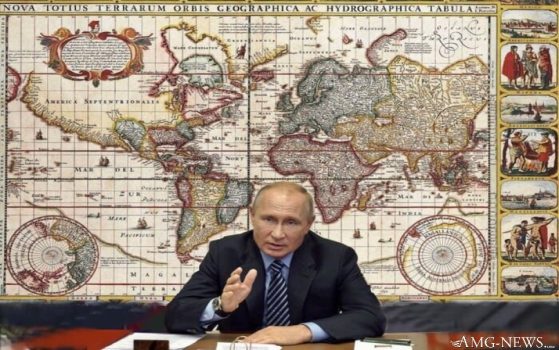The Enigma of the Lost Empire: Russian President Vladimir Putin Makes New Tartaria Archive Public
Medeea Greere, an independent publisher, is now on Telegram at https://t.me/AMGNEWS2022 and exists only on reader support as we publish Truth, Freedom and Love for public awareness. Thank You for your support!
In an epoch-making revelation, Russian President Vladimir Putin takes the world by storm, inaugurating a new archive and casting light on the shadowy history of the once colossal empire, Tartaria. A ghost from the past re-emerges, beckoning us to re-examine our understanding of world history.
The cold January day of 15th, was forever etched into the annals of history. Russian President Vladimir Putin, an enigma in his own right, inaugurated a new archive, a treasure trove revealing a hidden realm of history. A silent guardian of the nation’s rich past, this repository would make Tartaria maps public. The question teetering on the edge of everyone’s lips: Why is this significant?
Well, my dear readers, the implications are momentous, indeed. This move signaled a profound paradigm shift. Russia, a nation of layered history and deep-rooted traditions, resolved to decant its true, non-counterfeit historical narratives, breaking free from the fetters of orthodox historiography.
Why? Because the power of a nation lies in its history. It is the compass that directs the future, the root that nourishes the national identity. A nation without its history is like a ship adrift in the stormy sea, aimlessly wandering with no harbor in sight.
The conventional historical narrative in Russia, akin to a tale weaved into the fabric of academic curricula, has origins dating back to the 18th century. It is tailored in accordance with the biblical Jewish concept of history, a legacy of the Romanovs, Russian rulers of yesteryears. However, this narrative truncated more than five and a half thousand years of the realm’s rich tapestry, a consequence of the transition from the original calendar to the Julian calendar.
WARNING: The Vatican Demanded this Be Kept Under Lock and Key: “The Divine Prayer – One Minute Prayer From Biblical Times” VIDEO BELOW
The Russian Federation now stands at the precipice of a paradigm shift. It is crafting a brand-new concept of education, a radical overhaul of history books that were churned out over the past two decades under the aegis of Western educational institutions and non-profit organizations. The journey to reclaim its history, its true identity, has begun in earnest.
The focal point of this journey is Tartaria, a mysterious empire relegated to the sidelines of global history. To many, this name might strike a discordant note, a hazy remnant of forgotten lore. While tales of Egypt’s pyramids, the Persian empire’s grandeur, the Ottoman’s resilience, and the Roman’s conquests populate our textbooks, the saga of Tartaria remains curiously absent. Despite dwarfing these empires in terms of its vast territorial expanse, Tartaria has been conspicuously missing from the historical discourse. Until now.
Over the years, this vast empire went by various monikers – Rassénia, Skátia, and finally, Tartaria. Historians like Jelena Ljubimová and Dmitry Mylnikov, among others, have started filling the void, shedding light on this massive state entity. Spread across several continents, Tartaria was home to millions who lived in harmony, fostering a self-sustained culture rooted in spiritual and moral virtues. They had a profound reverence for ancestors, justice, familial bonds, and their homeland.
SEE ALSO: The Vanished Glory of the Tartarian Empire: Unearthing a Lost Civilization (video)
The Tartarians, as the inhabitants were known, were an impressive race. Tall, red-haired, white-skinned, and blessed with captivating blue, green, or grey eyes, these Slavs-Aryans and Russians possessed an intriguing juxtaposition of characteristics. They were friendly and warm in times of peace, yet brave and ruthless in battles. In times of victory, they were just and compassionate; during adversities, they remained steadfast. Their indomitable spirit stemmed from their unwavering resolve to protect their Rod, their homeland, and uphold the moral purity and faith of their ancestors, rendering them nigh invincible.
The first edition of Encyclopedia Britannica, published in 1771, provides a fascinating insight into this enigmatic empire. Spanning from the Urals to Alaska and from New Earth to Tibet, Tartaria was a formidable entity in northern Asia, flanked by Siberia in the north and west. It was a complex mosaic of diverse tribes and people such as Astrachans, Cherkez, Dagestanians, Kalmy Tartars, Uzbek Tartarians, Mogulas, and Tibetan Tartarians, each with their unique culture and heritage. Tartaria was a testament to the harmony that could exist amidst diversity.
Despite its sheer scale and cultural significance, Tartaria’s existence was effaced from the pages of history with the dawn of the 18th century. The world’s largest empire, once prominently etched in the map from the 1771 Encyclopedia Britannica, faded into oblivion. Where are the remnants of this once-great empire? What became of its millions of inhabitants? Why has this remarkable civilization been airbrushed from our history books? These are questions that have haunted historians and laymen alike.
The mysterious disappearance of Tartaria from maps, books, and collective memory is baffling. Further editions of Encyclopedia Britannica bear no trace of its existence. A significant chunk of human history, spanning millennia, seems to have been swallowed up by the sands of time.
The unveiling of the Tartaria archives marks a critical juncture in the quest to uncover the truth. The Russian Federation has taken a monumental step towards rewriting the history of Tartaria, illuminating this hitherto unexplored realm. Will we finally unearth the truth about this colossal empire? Will Tartaria be reinstated in the annals of world history? Only time will tell.
One thing is for sure, the grand narrative of human civilization is incomplete without acknowledging the existence and contributions of Tartaria. The unveiling of these archives is a clarion call for historians, scholars, and truth-seekers worldwide to shed their biases and preconceived notions, to delve deep into the labyrinth of history and unearth the truth about Tartaria, the invisible empire.
The narrative of world history is akin to a vast jigsaw puzzle, and Tartaria is a missing piece. As we navigate through the 21st century, let’s hope that we can complete this puzzle, ensuring that the true tapestry of human civilization is finally unveiled. For the resurrection of Tartaria is not just a victory for Russia but for humanity at large. After all, the flame of truth shines brightest in the darkest corners of oblivion.












7 Comments
Tartar cloth also comes to mind. Tartan plaid.
Fascist & Fascia Weaponry.. interesting. Definitely a scorched Earth method. That or other weaponry capable of causing worldwide cataclysm?
The Hebrides.
The Hebron built Pyramids all over the Earth they knew the hebrew language of the planets and the stars.
There was no hebrew tribe but a language and the hebrons knew it. Hebrons are known as Ireland.
Where on Rumble can this video be found? Too difficult to view on my phone.
as you say……beautiful souls!
You are certainly the most daring to expose the situation on Earth and it doesn’t even matter that you didn’t give me a short info on a personal inquiry – intuition whispers that it was justified to ask, so it’s enough for me to mention this name – Valiant Thor.
This post is recommended to read the works by Nikolaj Levashov volumes 1 and 2 Russia in Curved Mirrors (there are indications from his environment that he was killed in 2012) ….and he was just presenting the true history of that area of the planet Earth, and there are also found archaeological remains as well as active plants that should not be approached without adequate protection, about which Valerij Uvarov has information…….and we also have a very, very significant announcement from the equally very interesting Nancy…”You have the right to the truth, I liked it you like it or you don’t.”
ah, bad translation for….(as active plants ) as well as active devices-
it would also be informative to do some research on the name Anton Anfalov Former University Profesor.
he has a very good interview, so if you’re interested in what it’s about, ask and I’ll show you.